|
|
|
Sort Order |
|
|
|
Items / Page
|
|
|
|
|
|
|
| Srl | Item |
| 1 |
ID:
159867
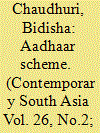

|
|
|
|
|
| Summary/Abstract |
The burgeoning influence of liberal market economy coupled with a ‘good governance’ paradigm across post-communist and post-colonial states emphasizes a market concept of equality, while turning ‘citizens’ into ‘customers’. This trend has been further accentuated by the massive inlets of Information Communication Technologies into governance mechanisms having a significant impact on the ways of governmentality and thereby on the substance and processes of documenting citizenship. It is in this wider context of intersecting economic and political changes that this paper captures the shifting regimes of citizenship in India as manifested through the processes of Unique Identification, or Aadhaar scheme, an initiative by the Government of India that seeks to give every Indian resident a unique identity documentation. Although Aadhaar does not authenticate citizen identity, nonetheless, in its promise to build a ‘national grid’ of identity information infrastructure, it indicates a meta-structure of a new inclusion/exclusion paradigm of citizen formation in India that appears to reinvent early liberal values of civic republicanism based on property rights. Rather than assessing the merits of this scheme, this paper demonstrates how new technologies of governmentality could impact the citizenship regime in India while keeping with the demands of a growing neo-liberal political economy.
|
|
|
|
|
|
|
|
|
|
|
|
|
|
|
|
| 2 |
ID:
083435
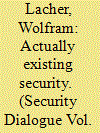

|
|
|
|
|
| Publication |
2008.
|
| Summary/Abstract |
The transformation of Saharan populations into an object of global security is analysed as a specific instance of security's expansion globally, as well as of its merger with development, understood as a side-effect of the former. It is shown that the search for threats in the Sahara, and the establishment of surveillance apparatuses, is a precondition for the detection and discursive production of these threats. Security, through its production of knowledge, manages to objectify what had hitherto constituted a borderland of knowledge and government. The securitization of the Sahara and its populations creates a field of intervention for diverse agents of security and development. However, it does so not as part of a coherent global regime of control, but on its own specific and random terms, within a political economy of danger that is the product of discursive and material struggles. The securitization of the Sahara, it is argued, should be seen as actually existing security - that is, a complex of security practices serving diverse interests, with contradictory and open-ended outcomes
|
|
|
|
|
|
|
|
|
|
|
|
|
|
|
|
| 3 |
ID:
121825
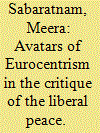

|
|
|
|
|
| Publication |
2013.
|
| Summary/Abstract |
Recent scholarly critiques of the so-called liberal peace raise important political and ethical challenges to practices of postwar intervention in the global South. However, their conceptual and analytic approaches have tended to reproduce rather than challenge the intellectual Eurocentrism underpinning the liberal peace. Eurocentric features of the critiques include the methodological bypassing of target subjects in research, the analytic bypassing of subjects through frameworks of governmentality, the assumed ontological split between the 'liberal' and the 'local', and a nostalgia for the liberal subject and the liberal social contract as alternative bases for politics. These collectively produce a 'paradox of liberalism' that sees the liberal peace as oppressive but also the only true source of emancipation. However, the article suggests that a repoliticization of colonial difference offers an alternative 'decolonizing' approach to critical analysis through repositioning the analytic gaze. Three alternative research strategies for critical analysis are briefly developed.
|
|
|
|
|
|
|
|
|
|
|
|
|
|
|
|
| 4 |
ID:
187030
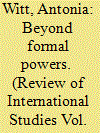

|
|
|
|
|
| Summary/Abstract |
International organisations (IOs) are said to command growing levels of authority. But in studying this phenomenon, scholars predominantly focus on the formal capacities member states assign to IOs. Much less attention is paid to the effects of IO authority, that is, how authority is exerted in practice and what it does within the affected societies. Based on a case study of the African Union's (AU) anti-coup regime, I make the case for a ‘bottom-up’ approach to IO authority, focusing on its localised enactment and effects. Analysing the AU's authority through a governmentality lens and drawing on several months of field research, I show that the AU's authority to govern coups is indeed effective: in commanding the re-establishment of constitutional order, the AU prescribes a particular imaginary of political order to resolve conflict and shapes the conduct of political actors in affected states by inscribing them into this order. But rather than operating in a top-down, direct way, the AU's authority is enacted in a distant, diffuse manner. Although based on formal powers assigned to the AU, neither the way this authority is exercised nor its effects can be inferred merely from these formal powers.
|
|
|
|
|
|
|
|
|
|
|
|
|
|
|
|
| 5 |
ID:
172344
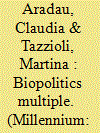

|
|
|
|
|
| Summary/Abstract |
This article proposes ‘biopolitics multiple’ as an approach to the heterogeneity of biopolitical technologies deployed to govern migration today. Building on work that has started to develop analytical vocabularies to diagnose biopolitical technologies that work neither by fostering life nor by making people die in a necropolitical sense, it conceptualises ‘extraction’ and ‘subtraction’ as two such technologies that take ‘hold’ of migrants’ lives today. Extraction, explored in the article through a focus on borderzones in Greece, captures the imbrication of biopolitics and value through the ‘outside’ creation of the economic conditions of data circulation. Subtraction, which is analysed in this article through a focus on Calais, captures the practices of (partial) non-governing by taking material and legal terrain away from migrants and reconfiguring convoluted geographies of (forced) hyper-mobility. This move allows us to understand the governmentality of migration beyond binary oppositions such as ‘making live/letting die’, biopolitics/necropolitics and inclusion/exclusion.
|
|
|
|
|
|
|
|
|
|
|
|
|
|
|
|
| 6 |
ID:
151191
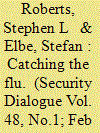

|
|
|
|
|
| Summary/Abstract |
How do algorithms shape the imaginary and practice of security? Does their proliferation point to a shift in the political rationality of security? If so, what is the nature and extent of that shift? This article argues that efforts to strengthen global health security are major drivers in the development and proliferation of new algorithmic security technologies. In response to a seeming epidemic of potentially lethal infectious disease outbreaks – including HIV/AIDS, Severe Acute Respiratory Syndrome (SARS), pandemic flu, Middle East Respiratory Syndrome (MERS), Ebola and Zika – governments and international organizations are now using several next-generation syndromic surveillance systems to rapidly detect new outbreaks globally. This article analyses the origins, design and function of three such internet-based surveillance systems: (1) the Program for Monitoring Emerging Diseases, (2) the Global Public Health Intelligence Network and (3) HealthMap. The article shows how each newly introduced system became progressively more reliant upon algorithms to mine an ever-growing volume of indirect data sources for the earliest signs of a possible new outbreak – gradually propelling algorithms into the heart of global outbreak detection. That turn to the algorithm marks a significant shift in the underlying problem, nature and role of knowledge in contemporary security policy.
|
|
|
|
|
|
|
|
|
|
|
|
|
|
|
|
| 7 |
ID:
174715
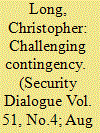

|
|
|
|
|
| Summary/Abstract |
Understandings of the nature or inherent workings of molecular life in the field of biopolitical security studies have today been characterized predominantly in terms of contingency. This article challenges this characterization. It does so by identifying a particular logic of operation that organizes political action and intervention at both the level of the population and the molecular in response to the threats of smallpox, Ebola and pandemic influenza. It argues that, in fact, rather than securing by instantiating a general economy of the contingent, governing practices rely upon the characterization of the nature of molecular life in terms of its constant biological dynamics. Governments around the world, and the US government in particular, have reacted to the increased likelihood of the emergence of disease through the stockpiling of new pharmaceuticals, including the antivirals ST-246, ZMapp and Tamiflu. Antivirals represent a pharmaceutical tool stockpiled by governments to ensure that they can respond to the emergence of novel biological threats. The characterization of the nature of molecular life in terms of its constant biological dynamics is so important, then, as it is this that underpins political programmes of preparedness that utilize antivirals in the prevention of disease.
|
|
|
|
|
|
|
|
|
|
|
|
|
|
|
|
| 8 |
ID:
189506
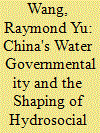

|
|
|
|
|
| Summary/Abstract |
This paper examines China's water governmentality in advancing the Lancang-Mekong Cooperation (LMC). It attends to how discourses, used as a political instrument, are framed, justified and contested in the reshaping of international hydrosocial territories. China's official and popular discourses present the LMC as promoting multilateral politics, economic benefits and social integration, while they obscure polarizing politics, external interventions and regional conflicts. Using strategies of positive publicity first, top-down communication and mutual empathy creation, these discourses aim to deflect attention away from controversies and geopolitics in the region to construct governable hydrosocial territories. However, in a transnational context where the Chinese state cannot unilaterally control geographical imaginaries, alternative discourses depict China as a “hydro-hegemon” that poses threats to downstream countries. The discursive dichotomy reflects multiple ontologies of water and power struggles in international river governance, bringing regional stability and sustainable development into question.
|
|
|
|
|
|
|
|
|
|
|
|
|
|
|
|
| 9 |
ID:
179773


|
|
|
|
|
| Summary/Abstract |
The relations between society and non-governmental organizations (NGOs) have been relatively neglected in the field of China NGO studies, which remains largely wedded to a state–NGO problematic within a state–society framework. In this anthropological study of an NGO’s post-Wenchuan earthquake recovery programme, we adopt an actor-oriented approach to identify the main lines of tension between the strategies, rationalities, and techniques deployed by the different actors in the field. Focusing on NGO–society relations, we take the NGO not as an incarnation of society vis-a-vis the state, nor as an incarnation of the state vis-a-vis society, but as a key link in a shifting chain of state and non-state actors that aims to introduce to local society an assemblage of techniques, discourses, and values for the promotion of self-government. This ‘international development package’ is a specific form of what social scientists have theorized as ‘governmentality’. In this case study, the modalities of participation and cooperative self-government promoted within this development package are in tension with local values, social relations, and political structures. The case shows that dynamic tensions between the actors are mediated by the deployment of practices of governance that circulate between international institutions and networks, state agencies, NGOs, and local authorities and actors.
|
|
|
|
|
|
|
|
|
|
|
|
|
|
|
|
| 10 |
ID:
139676
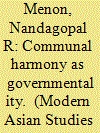

|
|
|
|
|
| Summary/Abstract |
Debates about secularism in post-independence India have often revolved around the visions of two of the country’s founding fathers—M.K.Gandhi and Jawaharlal Nehru. A sharp distinction is drawn between them by those who argue that the Gandhian model (or, what in common parlance and state discourses is called communal harmony) stems from Indian cultural and religious values, and lies beyond the realm of the state. The Nehruvian model, however, is a state project through and through. This article transcends this dichotomy to show that
the association of Nehru and Gandhi with these models does not necessarily mean that secularism and communal harmony faithfully reflect their ideas and, despite the differences in their aims and methods, both models are united in the discourses and practices of the state as strategies of ‘governmentality’. After redefining the core of communal harmony as reciprocity (rather than tolerance), I show how it is performed, how it supplements the state’s efforts to keep the peace in a religiously plural society by the force of law, and shores up the state’s
legitimacy deficit. However, the state’s simultaneous involvement in Nehruvian and Gandhian projects is not an innocuous fact because it undermines the state’s constitutional and secular obligations to non-discriminatory citizenship in the Indian nation. The argument is that the state’s endorsement of dargah-centred Islamic piety as an exemplary site of communal harmony and particular ideas of the Indian nation legitimized by communal harmony ‘problematizes’ the national belonging of certain kinds of pious Muslims.
|
|
|
|
|
|
|
|
|
|
|
|
|
|
|
|
| 11 |
ID:
185156
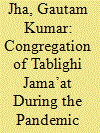

|
|
|
|
|
| Summary/Abstract |
Recently, the national and international media have cast Tablighi Jama’at (TJ)’s image and its members as the potential vectors for spreading the COVID-19 coronavirus globally. The media coverage also became significant as the TJ cast off the government’s advice to adjourn the congregation organized during the initial stage of spreading the virus in India, Indonesia and Malaysia and instead decried the government for interfering in its religious meetings and practices. The article discusses its ideological roots in various Islamic revivalist movements and activities inspired by pan-Islamic trends. TJ and its dogmatic ideological base are responsible for re-Islamizing a large section of lower and lower-middle-class Muslims. TJ calls for fellow Muslims to follow the puritanical form of Islamic practices to establish an Islamic state based on Sharia. The article also highlights that TJ’s conscious racial ghettoization efforts have resulted in an anomalous society, jeopardizing social harmony.
|
|
|
|
|
|
|
|
|
|
|
|
|
|
|
|
| 12 |
ID:
180208


|
|
|
|
|
| Summary/Abstract |
Contemporary liberal and democratic states have ‘securitized’ a growing number of issues by advancing the notion of societal security. This is coupled with a proactive stance and the conception of building societal resilience in order to withstand future crises and disturbances. The preemptive logic of contemporary security and crisis management calls for a new type of resilient neoliberal subject who is willing to accept uncertainty and shoulder greater individual responsibility for her own security. This article offers a genealogical analysis of this development in Sweden since the end of the Cold War, highlighting the role now assigned to citizens within social and national security planning. I argue that seeking a return to a more traditional notion of ‘total defence’ blurs the previously important war/peace and crisis/security distinctions. While war preparedness in previous eras was an exceptional aspect of human life and citizenship, the conceptions of security now evolving bind together societal and national security such that civil and war preparedness are merged into an ever-present dimension of everyday existence. The analysis also reveals that the responsibilization of individuals introduces a moral dimension into security and generates new forms of citizen–citizen relations. These extricate the sovereign powers of the state and the liberalist social contract between the state and its citizens.
|
|
|
|
|
|
|
|
|
|
|
|
|
|
|
|
| 13 |
ID:
183715
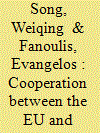

|
|
|
|
|
| Summary/Abstract |
The European Union's partnership with China has received significant academic attention. Experts have focused on both parties’ economic and political objectives and have made efforts to grasp the dynamics of the institutionalisation of EU-China cooperation. However, little has been said about how this collaboration affects the lives of citizens, especially in China. Adopting a Foucauldian epistemology, this article's key contention is that EU-China cooperation imposes a joint form of post-liberal governmental power on the Chinese population, which socially constructs empowered but not liberal political subjectivities for Chinese citizens. The article first reviews Foucault's approach to governmentality. It then explores Sino-EUropean collaboration after 2013, when the two partners established the ‘EU-China 2020 Strategic Agenda for Cooperation’. We illustrate how the institutionalisation of the partnership has been consistent with a governmentalised political rationality, and how policy implementation has allowed a post-liberal form of governmental power to flow from both EU and Chinese policymakers towards the Chinese population, triggering processes of political subjectivisation.
|
|
|
|
|
|
|
|
|
|
|
|
|
|
|
|
| 14 |
ID:
117913
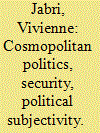

|
|
|
|
|
| Publication |
2012.
|
| Summary/Abstract |
Conventionally, the concept of cosmopolitanism is dealt with as a normative discourse. However, a far more useful understanding is to focus on the practices that the concept enables. The aim in this article is to highlight two manifestations of such practices, namely those that have as their imperative security, the cosmopolitanism of government, and those that might be defined in terms of solidarity, the cosmopolitanism of politics. Both the socio-historical context of the rise of liberal modernity as well as its late-modern manifestations in contemporary security practices suggest that these two articulations of cosmopolitanism should not be seen in oppositional terms, but rather as being mutually implicating and mutually present. While the concept enables a government of populations, containing within it a colonial rationality, the article suggests that there is an excess to the concept that steers it beyond government through security and towards the politics of solidarity. Placing the lens on the forms of political subjectivity generated through cosmopolitan practices, the article highlights the concept's potential in revealing the political implications of contemporary practices that have the postcolonial world as the primary target of their operations.
|
|
|
|
|
|
|
|
|
|
|
|
|
|
|
|
| 15 |
ID:
120000


|
|
|
|
|
| Publication |
2013.
|
| Summary/Abstract |
A variety of scholars in critical security studies have recently argued that new modes of neoliberal world order are influenced by the emergence of complexity theory in the sciences, which manifests itself, for example, in the discourse of resilience. By contrast, this article aims to point at the number of governmental discourses and practices in which 'old' understandings of order are persistent. What will be argued is that such a set of practices can be found in the regulation of genetically modified organisms (GMOs), in which the dominant approaches and strategies still rely on an understanding of life that is bound to a more traditional episteme that expresses the desire for predictable management with clearly controllable effects. The article then moves on to discourses of resilience to show how they are equally characterized by this episteme. In unravelling the struggle that exists between 'old' and 'new' epistemes, the article aims to elaborate on the potential of complexity discourses for challenging particular governmental rationales, manifested in both the resilience context and the GMO controversy.
|
|
|
|
|
|
|
|
|
|
|
|
|
|
|
|
| 16 |
ID:
139019
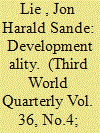

|
|
|
|
|
| Summary/Abstract |
The instituted order of development is changing, creating new power mechanisms ordering the relationship between donor and recipient institutions. Donors’ focus on partnership, participation and ownership has radically transformed the orchestration of aid. While the formal order of this new aid architecture aimed to alter inherently asymmetrical donor–recipient relations by installing the recipient side with greater freedom and responsibility, this article – drawing on an analysis of the World Bank’s Poverty Reduction and Strategy Paper (PRSP) model and its partnership with Uganda – demonstrates how lopsided aid relations are being reproduced in profound ways. Analysed in terms of developmentality, the article shows how the donor aspires to make its policies those of the recipient as a means to govern at a distance, where promises of greater inclusion and freedom facilitate new governance mechanisms enabling the donor to retain control by framing the partnership and thus limiting the conditions under which the recipient exercises the freedom it has been granted.
|
|
|
|
|
|
|
|
|
|
|
|
|
|
|
|
| 17 |
ID:
139769
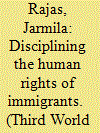

|
|
|
|
|
| Summary/Abstract |
This paper investigates the technologies of controlling migration and how the human rights of third-country nationals are disciplined and limited in many European Union member states. It discusses the rationalities of allowing entry as they are inscribed in the Schengen visa regulations and in the regulations relating to resident permits and family reunification rights in various European countries. Specifically the paper sheds light on how market veridiction results in the disciplining of human rights in these policies. The analysis is conducted through a Foucauldian governmentality framework entailing an analysis of the problematisations of immigration through market veridiction and how these are applied today to limit immigrants’ human rights. The paper then compares these rationalities to eugenic justifications for problematising immigration in the USA from 1860s onwards. This historical comparison shows how social Darwinist notions of human worth continue to function at the level of rationalities and technologies of disciplining immigrants’ human rights. The paper concludes that market veridiction makes human rights function inside a framework of (e)quality in which human worth is calculated as ‘quality’ and not as ‘equality’, and shows how migrants’ human rights are made to function as something to be earned rather than something inherent or inalienable.
|
|
|
|
|
|
|
|
|
|
|
|
|
|
|
|
| 18 |
ID:
152720
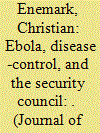

|
|
|
|
|
| Summary/Abstract |
In 2014, the United Nations Security Council (UNSC) described the Ebola outbreak then ongoing in West Africa as “a threat to international peace and security.” Resolution 2177 was the first time a disease outbreak of natural origin had been described using language ordinarily applied to political violence. This article assesses the significance of Resolution 2177 as an instrument of health governance, with particular regard to the Council’s primary aim: to bring about the lifting of state-imposed bans on travel to and from West Africa. The UNSC’s response might at first appear to have been an international-level attempt to remove Ebola from the realm of security policy for the sake of public health. However, the use of threat language in Resolution 2177, alongside the rapid mobilization of disease-control resources by some governments represented on the Council, suggests that some kind of security logic was driving the international response to Ebola. I posit that it was not the logic of securitization, based upon the use of borders as barriers to contagion, that drove UN policy. Rather, the UNSC appears to have acted according to the security logic of governmentality, whereby the health of populations (within and beyond West Africa) would be secured by facilitating cross-border circulation of medical professionals. The Council’s contribution to health governance was to support a shift in security logic: from securitization to securing circulation.
|
|
|
|
|
|
|
|
|
|
|
|
|
|
|
|
| 19 |
ID:
133255
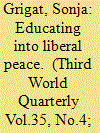

|
|
|
|
|
| Publication |
2014.
|
| Summary/Abstract |
Indonesia has seen excessive political violence in the first years since the end of autocratic rule under former president Suharto. Documented violence has ranged from separatist struggle to communal strife to terrorist attacks. The International Crisis Group (icg) has reported extensively on the conflicts underlying this violence and has formulated policy advice on how to overcome them. While the icg's reports on Indonesia have been acknowledged for their detailed and accurate account of micro-level violence, their recommendations reveal their political objectives. The icg's panacea for overcoming violent conflicts is institution building and security sector reform, which are centrepieces of the 'standard programme' of liberal peace- and state building. However, it is not only its policy advice but all the icg's publications in general that aim to diffuse the liberal governance agenda. This article argues that, through the narrative technique of epideictic oratory, the icg is aiming to educate its audience into a liberal governmentality characterised by practices and procedures which effect a de-politicisation of violence, foster liberal forms of governance and self-government and thus contribute to sustaining liberalism as a global 'regime of power'.
|
|
|
|
|
|
|
|
|
|
|
|
|
|
|
|
| 20 |
ID:
139771
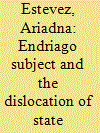

|
|
|
|
|
| Summary/Abstract |
Mexico is arguably immersed in an unprecedented wave of violence in which drug cartels and law enforcement officials at times work together in cases of forced disappearance, kidnapping, execution, torture, persecution and other atrocities considered violations of the most basic human rights, including the right to life and to physical integrity. However, these atrocities are only classified as human rights violations if they can be unequivocally attributed to the state; this is not always possible. Using Foucault’s idea of governmentality and Valencia’s concept of the Endriago as a subjectivity emerging from the specific governmentalisation of the Mexican state, this article examines how hybrid agents in Mexico – law enforcement officials working for criminal gangs or criminals working for the state – serve to subvert common understandings of attribution and responsibility in the state-centric discourse of human rights in general, and of the right of asylum in the specific case of Canada, a country to which thousands of Mexicans have fled.
|
|
|
|
|
|
|
|
|
|
|
|
|
|
|
|
|
|
|
|
|